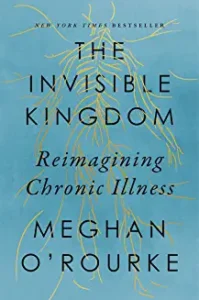The Invisible Kingdom by Meghan O’Rourke 2022
O’Rourke, the editor of the Yale Review and essayist for The New Yorker, the Atlantic, and other periodicals, has written a remarkable book.
It was often difficult and uncomfortable to read this detailed story of her chronic illness and the often devastating and depressing impact on her daily life. Her symptoms began in 1997 shortly after graduating from college and affected her in variable degrees until the decade between 2002 and 2012 when she was often disabled by them. An assortment of non-specific, often vague symptoms including fatigue, headache, rashes, feelings of electric shocks in her limbs, and brain fog were dismissed by doctor after doctor, specialists from neurologists to gastroenterologists and many in between. The catalog of symptoms along with lab tests that were either normal or non-specifically abnormal, led to the familiar diagnosis of ‘it’s all in your head’ and ‘perhaps you should see a therapist’. Desperate to find a diagnosis, eager to have a child, depressed by her inability to work and wanting to enjoy her life again, she sought help from non-traditional medicine and then turned her exceptional reportorial skills and investigative instincts into delving into why those with chronic, non-specific illnesses are so failed by the American health system.
These affected and afflicted individuals are primarily women, between 20 and 50, with diagnoses of chronic fatigue syndrome, post-treatment Lyme Disease, and other controversial labels, who fall into the ‘no-man’s land’ of ‘biology and biography’. Exposed to viruses (Epstein-Barr is often the culprit), living in a toxic chemical environment that is the US in the 21st C, stressed by high pressured jobs and family obligations, with a microbial biome that has been altered by the overuse of antibiotics, and having an immune system that is genetically coded to over-react, they experience real and debilitating symptoms over time. Today’s doctors, siloed and focused on cure not management and the ‘one disease, one cure’ model, are not equipped to manage patients like O’Rourke and are quick to jump to the ‘all in your head’ explanation, leaving patients with nowhere to turn.
O’Rourke points out that long haul COVID has created a new dynamic in which academic medicine, after years of refusing to recognize chronic illnesses such as fibromyalgia and chronic fatigue syndrome, has begun to understand that viral infections are handled in different ways in different individuals and can lead to chronic, non-specific illness. The long haul COVID phenomenon, and hence, many of these other non-specific autoimmune diseases, can no longer be dismissed as psychosomatic because of the immense numbers of people affected.
Having identified this issue, O’Rourke goes on to examine the growing problem of autoimmunity and how some US medical care systems are recognizing and reorganizing to treat the individuals with these disorders. Progress is slow though examples like the Mount Sinai Center for Post-COVID Care are beginning to organize care with the goal of managing, not curing these chronic illnesses.
In her own experience, O’Rourke finally found a physician who was interested and had extensive experience in treating these chronic illnesses who convinced her to take doxycycline for what he was convinced was chronic Lyme Disease. She vastly improved and was able to return to a somewhat normal life, become the mother of two children, and return to work, though her symptoms continued to return from time to time. She even tried a FMT, a fecal microbiota transplant, traveling to England to undergo the therapy.
O’Rourke has given voice to a huge number of individuals suffering with these conditions. In her final chapter The Wisdom Narrative, she quotes Virginia Woolf’s essay on ‘Being Ill’, Susan Sontag’s book, ‘Illness as Metaphor’, Atul Gawande’s ‘Being Mortal’, and the medical sociologist, Arthur Frank, as she delves into the question of whether illness can lead to wisdom, i.e. is there any redemptive value in being sick?. Frank divides illness narratives into three categories: restitution (you’re sick but you get cured), chaos (experiencing life without sequence or discernable causality of your illness) and quest (the ability to synthesize the patient experience into a meaning of some kind). For O’Rourke and others living with these chronic disabling conditions, it is a chaos narrative, one to be tolerated and managed. What she is seeking ultimately, is an American health system that trains doctors to tolerate uncertainty (that old Keatsian negative capability) and enables them to practice in a manner which can support this chaos and provide empathy and care to the individuals who live with chronic illness.
Not an easy book to read and I’m still trying to sort out the science in her claims, but I think it’s potentially a ground breaker and a means for a paradigm shift for medicine, as was Gawande’s ‘Being Mortal’ and the Institute of Medicine’s 1999 report on medical errors. ‘To Err is Human’. For now, I come down on the side of it being an important book which should be read by people with these conditions and by their doctors. (Addendum: Since writing this, I’ve exchanged emails with a noted rheumatologist who has been focused on long haul COVID for 2 years, and he holds O’Rourke’s book in high esteem, quoting her in the final sentence of his own book on these chronic conditions!).



